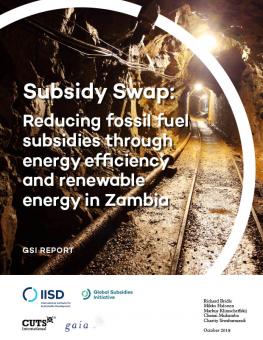
Subsidy Swap: Reducing fossil fuel subsidies through energy efficiency and renewable energy in Zambia
This report examines the potential of subsidy reform to improve cost recovery in the electricity sector and promote clean energy and energy efficiency in Zambia.
In Zambia’s electricity sector, demand has risen faster than supply.
In response to rising demand, several new power plants have been commissioned, including the 300 MW Maamba coal power plant and the 120 MW Itezhi Tezhi hydropower plant in 2016. Subsidies, particularly in the form of under-recovery of electricity sector revenues caused by below-cost pricing, have led to electricity sector deficits and threatened the financial sustainability of the sector.
Price increases in the electricity sector in 2017 of 75 per cent have reduced electricity sector subsidies, but costs remain higher than revenues. This report explores how subsidy reform could help to reduce the cost of subsidies and promote a transition to energy efficiency and clean energy. The report focuses on the mining sector, which is responsible for more than half of all electricity consumption, and the potential of solar PV.
Participating experts
You might also be interested in
The Cost of Fossil Fuel Reliance
Government support for fossil fuels reached at least USD 1.5 trillion in 2023, new data shows.
Increased Support Needed to Achieve India's Clean Energy Goals
India is on track to achieve many of its 2030 clean energy goals but needs to step up government support measures to accelerate the deployment of offshore wind, electric vehicles, and green hydrogen, according to a new report.
Ending Export Credits for Oil and Gas: How OECD countries can end 2024 with a climate win
For a year now, Organisation of Petroleum Exporting Countries (OECD) governments have been negotiating an agreement that could put an end to oil and gas export finance. Following the acrimony in Baku, this would be a very real way for the OECD to show policy coherence, respond to calls from the poorest countries to stop subsidizing fossil fuels, and shift public finance to solutions.
Fossil Fuel Production, Renewable Energy, and Subsidy Reform in Nationally Determined Contributions 3.0
This policy brief provides an analysis of the critical benchmarks and recommendations necessary for aligning nationally determined contributions (NDCs) with the 1.5 °C target.